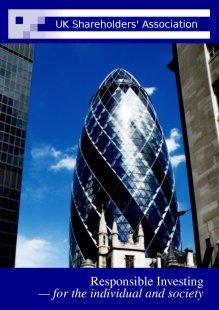This was an excellent event, well organised by the FRC with about 80 attendees from ShareSoc and the UK Shareholders' Association.
It is very reassuring to hear the underlying messages now coming from the FRC. For example there is a significant change of approach on transparency which is very much to be applauded. Audit reports conducted by the FRC will be placed in the public domain although legislation will be required for this to happen routinely. It is also clear that oversight of audit quality is receiving much more attention. Following hard on the heels of yesterday's presentation from David Rule, I was very pleased to see the FRC news alert yesterday (6th November) 'Auditors need to improve their challenge of management urgently'. Do read this by clicking here. It doesn't pull its punches in terms of what the FRC is expecting from auditors.
At the same time, the much sharper focus on Stewardship and Governance with David Styles in charge of this area is most welcome.
I know that there is much more to be done over the next two to three years. Whatever, the future brings, Sir Jon Thomson made it clear that it will not be 'business as usual'. That also is a welcome change.
Sir Jon Thomson the new CEO opened the meeting and spoke of his plans – he made the proviso that he has only been in place 5 weeks so I don’t think these are set in stone. The Audit, Reporting and Governance Authority (ARGA) is taking over the role of the FRC and most of its employees will be transferring across. ARGA needs legislation before it can officially commence and currently we are in purdah because of the General Election. Sir Jon has to implement the 83 recommendations of Kingman, probably another 60 or so from Brydon (expect these on 9 Jan 2020) and several more from the CMA (Competition and Markets Authority). He noted that Freedom of Information Requests can be made and have to be published after 1 Dec 2019 – previously the FRC was exempt from FOI. Not only this, it was admitted that the FRC's complaints procedure did not 'look good'. Up to now complainants have not been given any information on whether a complaint has been addressed. This will change.
He also gave his view that a lot of shareholders do not engage and they outsource it to proxy people. This was honest and candid but I don’t think it might not endear him with many of the governance folk in institutional investors.
One questioner asked him why UK directors don’t go to jail, as they do in US? He noted that one of the big differences is Sarbanes-Oxley which requires directors to sign off on what is in accounts. It is of course the SFO which has to prosecute in the UK and send people to jail, not the FRC. The FRC fines people, firms and companies, censures them and can strike them off - and, even in this case, only if they are qualified accountants. This is something else which Sir John Kingman in his review of the FRC recommended should be changed and which BEIS will be following up. There has already been a big leap in the fines that the FRC has levied on auditors - up from £15.5m in the year to March 2018 to £42.9m in the year to March 2019.
Robin Goodfellow (ShareSoc-UKSA member) asked about a £30 million error in the accounts of a £50 million market cap VCT, who he had reported to the FRC, and why he had not been told of progress other than a letter citing the FRC procedures which told him nothing of value. He handed over a letter to the FRC and Sir Jon assured him that this would be followed up.
Mark Babington spoke about changes in ethical standards for auditors and on-going concern reporting. To its credit the FRC decided not to wait for Sir John Kingman's recommendations on on-going concern reporting. There was sufficient reason to believe that action was needed urgently. In future, auditors will have to actively look for information that contradicts management's views rather than just accepting the information that supports their views. They will also have say clearly what work they did to support their going concern view.
The list of non-audit services that auditors can provide to their audit clients is also to be tightened significantly. There will be a specific list of services that can be provided. Everything else will be off limits. Furthermore, anything that does not comply with good ethical practice must be disclosed.
David Styles gave us an update on the FRC’s UK Corporate Governance Code and the 2020 Stewardship Code. Cliff Weight asked (having first pointed out that individual investors own 10% of FTSE 100 companies, 19% of other Main Market companies and 30% of AIM) how important did they see individual investors in contributing to stewardship. It was gratifying to hear David’s reply “the collective voice of individual shareholders is very important and one that the FRC can support”. Stewardship reporting by fund managers will also focus much more on activities and outcomes under the new Stewardship Code. Are these just fine words? I suspect not. I attended another FRC stakeholder meeting recently at which ethical and cultural reporting was on the agenda. The most critical voice was that of the FRC: too much reporting on ethics and culture by companies focused on process and failed to answer the 'So what?' question.
Both UKSA and ShareSoc will look forward to continuing to engage closely with you and doing whatever we can to support and encourage the change that is now taking place.

